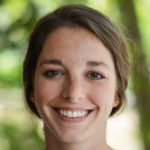 Meghan Puglia, PhD, an assistant professor in the Department of Neurology, is studying the role of touch and stimuli in infant neurological development hoping to learn how genes influence behavior over time during a child’s development. She hopes to ultimately create a universal autism screening for babies. Earlier screenings while a child’s brain is still developing could lead to more treatment options and a path to a more fulfilling life.
Meghan Puglia, PhD, an assistant professor in the Department of Neurology, is studying the role of touch and stimuli in infant neurological development hoping to learn how genes influence behavior over time during a child’s development. She hopes to ultimately create a universal autism screening for babies. Earlier screenings while a child’s brain is still developing could lead to more treatment options and a path to a more fulfilling life.
Right now, the only way we can diagnose autism is by looking at a child’s behavior. The earliest age we can diagnose is shortly before 2 years, but a child often isn’t diagnosed until age 5 or older. By waiting so long, we’re missing out on critical periods of development. Our hope is to develop a quick and easy tool that can identify babies that may not be processing social information in an optimal manner. ~Meghan Puglia, PhD
To measure electrical activity in the brain, Puglia’s team is using an electroencephalography (EEG) receptor skullcap and a touch test using a high-tech brush to collect data on how the strokes activate receptors in the brain. The children are studied from birth to 2 months and at regular intervals after that until 16 months and then ideally when they are toddler.
More about the Developmental Neuroanalytics Lab.
